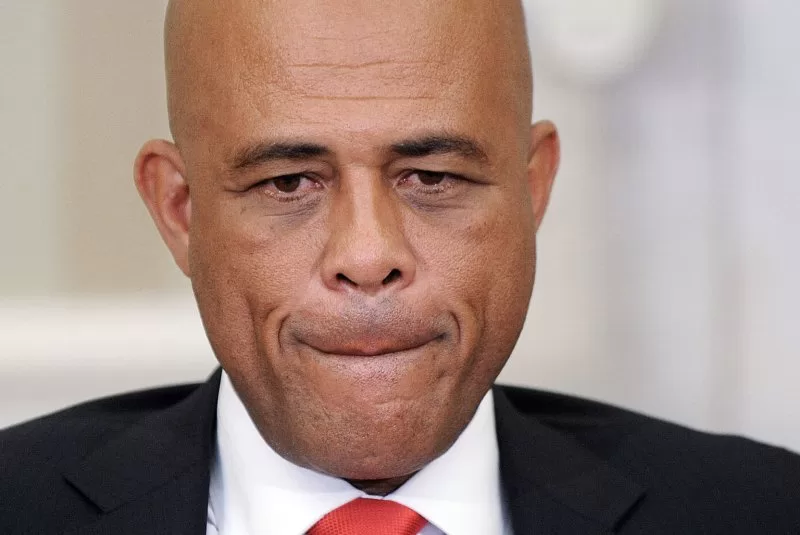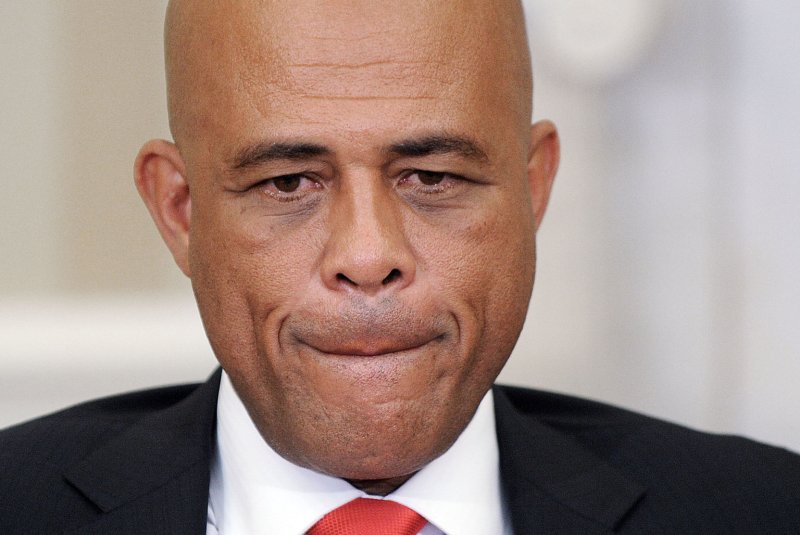Martelly, 63, lead Haiti from 2011-2016 and allegedly abused his influence to facilitate the trafficking of drugs, such as cocaine, that was destined for the U.S. market, the U.S. Treasury announced Tuesday in new sanctions on the former leader. Pool Photo by Olivier Douliery/UPI |
License PhotoAug. 20 (UPI) — The U.S. Treasury Department on Tuesday announced sanctions on Haiti’s former president after allegations he abused his power in order to take part in international drug trafficking and money laundering, the U.S. Treasury said Tuesday.
The Treasury Department’s Office of Foreign Assets Control revealed that former Haitian President Michel Joseph Martelly, 63, who was also known as “Sweet Micky,” allegedly engaged or attempted to facilitate the trade of illicit drugs on a global scale and into the U.S.
The steps taken by Treasury highlight the “significant and destabilizing” role Martelly and “other corrupt political elites have played in perpetuating the ongoing crisis in Haiti,” said Acting Under Secretary for Terrorism and Financial Intelligence Bradley T. Smith.
Treasury’s OFAC “coordinated closely,” according to a news release, with the Drug Enforcement Administration on the new sanctions imposed on the former leader of the Caribbean island nation, as it said Martelly’s actions posed a “significant risk” to “the international proliferation of illicit drugs or their means of production.”
He also has an outstanding arrest warrant issued in January by a Haitian judge as part of a broader case accusing more than 30 high-ranking officials of corruption.
Martelly, 63, who led Haiti from 2011-2016, had allegedly abused his influence as president to facilitate the trafficking of drugs, such as cocaine, that was destined for the U.S. market.
His five-year presidential term was regarded as autocratic. Martelly, who had been one of Haiti’s most popular entertainers, was accused of living a lavish and corrupt lifestyle and left the country after elections which critics said were fraudulent.
The U.S. government contends that Martelly had additionally engaged in laundering drug proceeds, worked with Haitian drug traffickers and sponsored “multiple Haiti-based gangs.”
He took charge of a still chronically poor country which at the time in 2011 was suffering from a cholera outbreak and the aftereffects of a devastating magnitude 7 earthquake in January 2010 that killed more than 300,000 people, injuring an equal number, and left 1 million Haitian citizens homeless.
Haiti is a known transit point for illicit drugs entering the United States, and Haitian political and business elites have “long been involved in drug trafficking and have been linked to the gangs responsible for the violence that has destabilized Haiti,” Treasury said.
The department said the existence of human rights abuses and “widespread gang activity” that remains ongoing “creates a permissive environment for drug trafficking activities.”
The ex-Haitian leader was previously sanctioned in November 2022 by the Canadian government for allegedly financing gangs.
Smith said the U.S. along with its international partners are “committed to disrupting those who facilitate the drug trafficking, corruption, and other illicit activities fueling the horrific gang violence and political instability,”
But while the ultimate goal of sanctions is not necessarily to punish, the Treasury said its actions are intended to “bring about a positive change in behavior.”
Under Martello’s new sanctions, U.S. financial institutions are prohibited from making loans or providing him credit, Americans are prohibited from investing or purchasing “significant amounts of equity or debt instruments” of Martelly’s and any foreign exchange transaction shall be subject to U.S. laws
The Hispaniola island nations’ former prime minister in March resigned following the installation of a transitional presidential council amid a surge in gang violence which has taken over the Haitian part of the island next to the Dominican Republican.
Then in June, Kenyan military forces, operating as part of a multinational security mission, arrived in Haiti with “strong support” from the U.S. for its peacekeeping mission as rampant and deadly gang violence continued.

